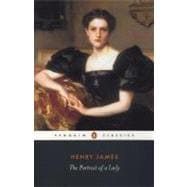
The New copy of this book will include any supplemental materials advertised. Please check the title of the book to determine if it should include any access cards, study guides, lab manuals, CDs, etc.
The Used, Rental and eBook copies of this book are not guaranteed to include any supplemental materials. Typically, only the book itself is included. This is true even if the title states it includes any access cards, study guides, lab manuals, CDs, etc.
Isabel saw no more of her attributive victim for the next twenty-four hours, but on the second day after the visit to the opera she encountered him in the gallery of the Capitol, where he stood before the lion of the collection, the statue of the Dying Gladiator. She had come in with her companions, among whom, on this occasion again, Gilbert Osmond had his place, and the party, having ascended the staircase, entered the first and finest of the rooms. Lord Warburton addressed her alertly enough, but said in a moment that he was leaving the gallery. 'And I'm leaving Rome,' he added. 'I must bid you goodbye.' Isabel, inconsequently enough, was now sorry to hear it. This was perhaps because she had ceased to be afraid of his renewing his suit; she was thinking of something else. She was on the point of naming her regret but she checked herself and simply wished him a happy journey; which made him look at her rather unlightedly. 'I'm afraid you'll think me very "volatile". I told you the other day I wanted so much to stop.'
'Oh no; you can easily change your mind.'
'That's what I have dome.'
'Bon voyage then.'
'You're in a great hurry to get rid of me,' said his lordship quite dismally.
'Not in the least. But I hate partings.'
'You don't care what I do,' he went on pitifully.
Isabel looked at him a moment. 'Ah,' she said, 'you're not keeping your promise!'
He coloured like a boy of fifteen. 'If I'm not, then it's because I can't; and that's why I'm going.'
'Good-bye then.'
'Good-bye.' He lingered still, however. 'When shall I see you again?'
Isabel hesitated, but soon, as if she had had a happy inspiration: 'Some day after you're married.'
'That will never be. It will be after you are.'
'That will do as well,' she smiled.
'Yes, quite as well. Good-bye.'
They shook hands, and he left her alone in the glorious room, among the shining antique marbles. She sat down in the centre of the circle of these presences, regarding them vaguely, resting her eyes on the beautiful blank faces; listening, as it were, to their eternal silence. It is impossible, in Rome at least, to look long at a great company of Greek sculptures without feeling the effect of their noble quietude; which, as with a high door closed for the ceremony, slowly drops on the spirit the large white mantle of peace. I say in Rome especially, because the Roman air is exquisite medium for such impressions. The golden sunshine mingles with them the deep stillness of the past, so vivid yet, though it is nothing but a void full of names, seems to throw a solemn spell upon them. The blinds were partly closed in the windows of the Capitol, and a clear, warm shadow rested on the figures and made them more mildly human. Isabel sat there a long time, under the charm of their motionless grace, wondering to what, of their experience, their absent eyes were open, and how, to our ears, their alien lips would sound. The dark red walls of the room threw them into relief; the polished marble floor reflected their beauty. She had seen them all before, but her enjoyment repeated itself, and it was all the greater because she was glad again, for the time, to be alone. At last, however, her attention lapsed, drawn off by a deeper tide of life. An occasional tourist came in, stopped and stared a moment at the Dying Gladiator, and then passed out of the door, creaking over the smooth pavement. At the end of half an hour Gilbert Osmond reappeared, apparently in advance of his companions. He strolled towards her slowly, with his hands behind him and his usual enquiring, yet not quite appealing smile. 'I'm surprised to find you alone, I thought you had company.'
'So I have - the best.' And she glanced at the Antinous and the Faun.
'Do you call them better company than an English peer?'
'Ah, my English peer left me some time ago.' She got up, speaking with intention a little dryly.
Mr Osmond noted her dryness, which contributed for him to the interest of his question. 'I'm afraid that what I heard the other evening is true: you're rather cruel to that nobleman.'
Isabel looked a moment at the vanquished Gladiator. 'It's not true. I'm scrupulously kind.'
'That's exactly what I mean!' Gilbert Osmond returned, and with such happy hilarity that his joke needs to be explained. We know that he was fond of originals, of rarities, of the superior and the exquisite; and now that he had seen Lord Warburton, whom he thought a very fine example of his race and order, he perceived a new attraction in the idea of taking to himself a young lady who had qualified herself to figure in his collection of choice objects by declining so noble a hand.
Chapter 28, p352-354